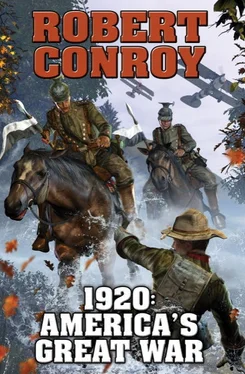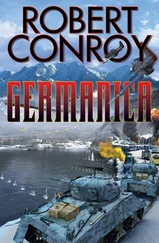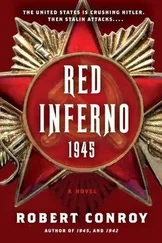* * *
“When and where?” Ike wondered and Luke had no answer. The American lines ran about fifty miles across from just south of Santa Cruz on the Pacific coast to south of Modesto where they veered north and petered out in the foothills. Each side scouted the other to prevent an end around, but the Germans didn’t seem interested in trying such a maneuver and the Americans lacked the capability to pull it off.
The German works paralleled the American’s and were, on average, a mere mile away from them. There was sniping and patrolling all along the lines. Casualties were light, but this was scant comfort to those who were killed and wounded in the skirmishes. Each side was waiting. The Germans were gathering their strength and the waiting would be over very shortly.
A knock on the door to his office and a burly sergeant stuck his head in, “Got a prisoner for you, sir. General Eisenhower thinks you should talk to him.”
Luke smiled and stood up. “What the general wants, the general gets.”
The prisoner was under guard in a converted conference room. A pair of thuggish goons from the provost marshal’s office glared down at him. They had billy-clubs in their hands and twirled them menacingly. The German was in his very early twenties and looked frightened. A slight, wiry youth, scarcely out of his teens, his eyes darted around the room and at the angry Americans who looked like they wanted to kill him, which was the impression that Luke wanted them to give.
Luke sized up the situation and ordered the others out. Now he would be the good-guy interrogator. He offered the young man water and food. The boy brightened considerably.
“What’s your name, son?”
“Hans, sir, Hans Kessler.”
“And where are you from?”
“Sir, I was born and raised in Innsbruck.”
Luke stiffened. Innsbruck was in Austria and, even though the Austrians had declared war on the United States as dutiful allies of Imperial Germany, the act hadn’t meant much. Austria was a long ways away. Or was it? Had the young Austro-Hungarian emperor, Karl I, been talked into a more active role by the belligerent and domineering kaiser?
A roast beef sandwich arrived along with a couple of cookies and a glass of Coca Cola. Kessler proceeded to devour them as if he was starving. Of course, a healthy young man like him could be desperately hungry in a matter of hours.
“What did you do before you joined the army, Hans?”
“I worked on the mountains with my father and brothers. Sometimes we taught tourists how to ski and sometimes we had to rescue the fools when they got hurt or lost.” He grinned. “Sometimes the women were very grateful.”
Luke laughed along with the prisoner and thought that maybe he wasn’t as young or innocent as he first thought. “Along with skiing, did you do any real mountain climbing?”
Kessler rolled his eyes. “A lot, sir, and that’s why I’m here. I got drafted into the Alpine Corps and then my regiment was sent here. They say we volunteered for it, but I don’t remember volunteering for anything.” He shrugged. “Of course, nobody in any army ever volunteers for anything.”
* * *
Ike had found the prisoner’s information intriguing enough to ask for an audience with the two senior military commanders.
Luke summarized the prisoner’s testimony. “In short, he’s a member of an elite Austrian Alpine regiment that’s now in California and listed as volunteers. Their job is to probe the hills and mountains around San Francisco and gather information as well as finding weak points in our defenses.”
Liggett leaned forward. “And these so-called volunteers are assigned to General Hutier?”
“Yes sir, at least this man’s regiment is. He didn’t know of any other Austrian units in California and I believe him.”
Sims was puzzled. “Why is his attachment to Hutier of such a concern?”
Liggett answered. “Hutier is an innovator. He may be a genius or a fool, depending, of course on whether or not he succeeds. He may have read of the Union General Emory Upton in the later stages of our Civil War, since his own theories mimic Upton’s. In short, Hutier believes in brief, intense bombardments followed by sharp, limited attacks at weak points that have been identified by people such as those in an Alpine regiment. Perhaps they will even use poison gas. The attackers swarm through in limited fronts, bypassing strongpoints, leaving them for followup forces to destroy.”
“Then Hutier’s corps is going to carry out the main attack?” Sims asked.
“Not likely,” Liggett answered. “There are too many logistical and geographic problems. Hutier’s corps is separated by bad terrain from the rest of the Germans, which limits the forces that can be used against the city. I am confident that the main German attack will come along the east side of the bay and try to sweep north of a monumentally outnumbered and outgunned American army in San Francisco, which must then either surrender or be pounded to pieces.
“Hutier’s attack, however, could be devastating if he manages to punch through to the city proper. It’s a digression without much cost. We must defend against it. If it succeeds, they will have won an inexpensive victory. In theory, Hutier’s tactics will work for a while, but his troops will sustain heavy casualties and run out of energy when dealing with a defense in depth. Unfortunately, the Germans are already through two of our three levels of fortification; thus, we do not really possess a defense in depth. If we are distracted by a massive assault elsewhere, Hutier may try to punch his way into the city and he may succeed.”
“We need to reinforce the city, sir,” said Ike.
“Easier said than done,” answered Liggett. “We’d have to strip lines where we think the main attack will come. In the meantime, I am creating a floating reserve by stripping badly needed men and guns from our trenches and placing them in a position where they can reinforce the point of attack.”
“Excellent,” said Sims.
“Possibly,” said Liggett. “The Germans will have doubtless anticipated this and will use their aerial superiority to interdict any attempt to reinforce the main army. We will use every plane we have to protect those troops moving up.”
Sims nodded. Not every plane, thought, he thought. “General Eisenhower, do you have a good idea where the attack will come?”
“Yes, Admiral,” He walked to the map and pointed to an area ten miles east of the bay in the middle of General von Mackensen’s army. Like Hutier, Mackensen was an exponent of sharp, limited attacks. Although seventy years old, the general was still a very competent field commander. “Our spies and the few flyovers we’ve managed to make indicate a major buildup in this area.”
Sims was puzzled. “Far be it for me to question army tactics, General, but why not reinforce the threatened area now? Why wait until the attack begins when it is reasonably obvious that’s where it will fall?”
Liggett mulled it over. Part of him hated being told his job by a damned admiral, no matter how close they’d become. But did Sims have a better idea than his? Damn. He remembered the dictum that he who defends everything winds up defending nothing. If he kept his army where it was, it would be too weak to repel a major assault. If he immediately reinforced the likely area of attack, he would strip other areas of what men and weapons they had. But then, they would be defeated anyhow. If he reinforced the area now and didn’t wait for the attack, he wouldn’t have to worry that much about German planes.
“We’ll do it,” he decided. “However, we do have men coming down by train from Seattle. When they arrive, they will immediately be sent to San Francisco. These are the men who made it across the Columbia River. It’s maddening that it’s taking so long for them to get here, but there is only one railroad line and virtually no other roads through the north that are useable this time of year.”
Читать дальше












